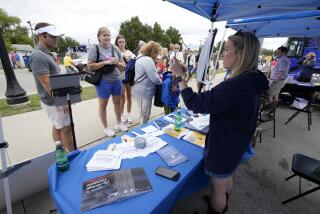Work-for-Tuition Plan Not Welcome in Some Professions
WASHINGTON — Even before President Clinton’s national service program has been formally proposed to Congress, public service professionals are making it clear that young people eager to participate by working on public projects in exchange for school tuition aid are not welcome everywhere.
Police groups have told Washington officials that they do not want them walking their beats. Teachers are not eager to have them as classroom aides. Unions caution that they must not take workers’ jobs.
But Administration officials profess to be undaunted by the resistance, arguing that opportunities for national service workers remain plentiful.
BACKGROUND: As the President describes it, the program, still being designed, would offer high school or college students--or both--a chance to pay some college tuition costs or repay student loans by being the foot soldiers for Administration initiatives, such as child-immunization programs, education and inner-city projects.
The idea, billed as a domestic Peace Corps or civilian GI Bill, was a cornerstone of Clinton’s campaign. Thousands of people have written to the White House asking to participate in pilot programs being designed for four to 10 areas of the country this summer. Many write that national service is their last hope for obtaining a college education because their family incomes are too high to qualify for other aid.
CONCERNS: But the White House’s office of national service also has received letters from organizations that fear that the plan would replace present wage-earners or send unqualified workers into their demanding fields.
Keith Geiger, president of the National Education Assn., said that without proper training, even college graduates thoroughly familiar with a subject are not qualified to teach it. He also said the profession is not interested in temporary teachers who are only in it to pay for their own educations.
Police groups have expressed wariness about the roles the national service workers might play, and shared the teachers’ concern that inexperienced workers could do more harm than good, particularly in their potentially dangerous profession.
Asking students to patrol with police officers would put the students in very dangerous situations, said Jerry Arenberg, spokesman for the National Assn. of Chiefs of Police.
Although the AFL-CIO has stressed that it is not against national service in principle, “workers already on the job should not be displaced,” said Candice Johnson, a spokeswoman for the AFL-CIO. To be certain that does not occur, AFL-CIO officials hope that their representatives will get to help determine the needs of specific communities and the jobs that national service participants should have.
RESPONSES: Eli Segal, who is responsible for designing the national service program, said his office has taken pains to assure critics that the program will not lower professional standards or take jobs from others.
“We see this as service and not jobs,” Segal said. “Once they understand this, they’re comfortable.”
So, instead of taking jobs as full classroom teachers, the participants are likely to be teachers’ aides and instructors of after-school programs.
Segal said police officials’ worries also are unwarranted because national service participants are likely to be involved in community policing and crime prevention, not patrolling.
While taking care not to alienate public service professionals, the national service program is trying to make sure that the jobs it offers will be challenging for participants, especially since many may be college graduates.
The Administration plans to propose its national service plan to Congress in late April or early May. The post-service benefit a participant can earn is likely to be between $5,000 and $10,000. Segal said that to ensure a quality experience for all participants, the program will grow slowly, with about 100,000 to 150,000 participants by the end of the President’s first term.
More to Read
Sign up for Essential California
The most important California stories and recommendations in your inbox every morning.
You may occasionally receive promotional content from the Los Angeles Times.










